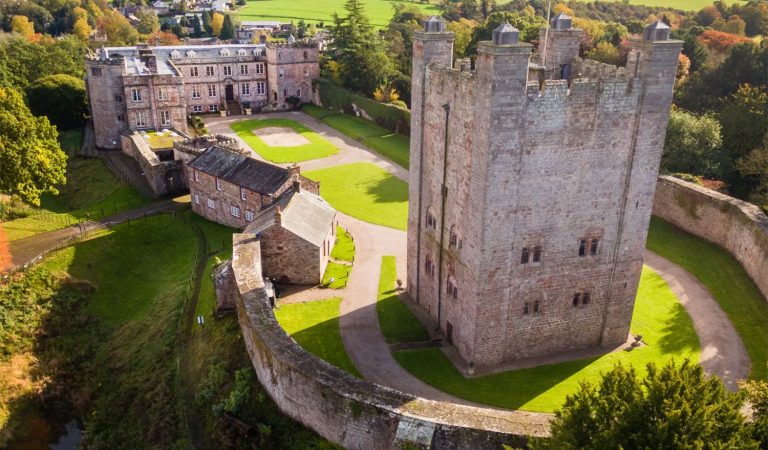- Accommodation
- What's On
- Things to Do
- Food and Drink
- Explore Cumbria
- Ideas and Inspiration
- Christmas & New Year
- Itineraries - Great days out
- Starring Great Britain: The Lake District, Cumbria
- Lake District, Cumbria Bucket List
- Selfie Guide
- Dark Skies Cumbria
- Cumbria Tourism Awards 2025
- The National Trust in the Lake District
- Sunny day ideas
- Rainy day ideas
- Romantic Breaks
- Family Holidays
- Dog Friendly Holidays
- Bespoke Holidays
- Caring for the environment
- Plan Your Visit
- Weddings
- Conferences & Event Spaces
- Prizes & Guides
- Let's Go Lake District Blog
- Special Offers
You are here: Home > Explore Cumbria > Appleby-in-Westmorland
The ancient market town and royal borough of Appleby is right in the heart of the Eden Valley and serves as the focal point for all of the surrounding villages and hamlets. There’s a good selection of traditional shops, while the riverside is perfect for a stroll or a picnic – there’s also an indoor swimming pool if you want something a little more energetic. The biggest event on the calendar is the annual horse fair that takes place in June.
Outside of town, the North Pennines lie directly east, with Cross Fell (893m) the tallest point and the distinctive conical peaks of Knock, Dufton and Murton pikes jutting up from the edge – the whole area is designated an Area of Outstanding Natural Beauty.
Culture & Heritage
The valley floor is occupied by the Eden River and its tributaries. The Romans marched through this valley between Carlisle and Brough: traces of one of the finest settlements in the northwest are at Ewe Close, made up of a series of hut circles and enclosure walls.
Older still is the double-ringed Oddendale Stone Circle and other prehistoric cairns on the limestone plateau to the south-west of Crosby Ravensworth, where you can also see evidence of Iron Age settlements.
During the 9th century, Viking settlers drawn to the rich grazing lands around the river founded the first settlements of Temple Sowerby, Bolton, Appleby, Great Ormside and Sandford. In the 11th century the Normans built the first castle on a high vantage point overlooking a river crossing at Appleby. The castle passed into the hands of the Clifford family in the 13th century, and they held it for the next 400 years: its most famous member was Lady Anne Clifford, who fought a 40-year battle to inherit her father’s estate, finally doing so in 1643. She devoted the rest of her life to restoring her family’s five castles – including the one at Appleby. Thanks to her, the castle is still open for tours, weddings, functions and conferences.

Photo: Appleby Castle
Appleby was the county town of Westmorland until 1974, when the boundary lines were redrawn and the ancient counties of Cumberland and Westmorland disappeared to be replaced by Cumbria (which also includes bits of Lancashire). Its former high status is still in evidence in the elegant uphill sweep of its tree-lined main street (Boroughgate) from the Norman church of St Lawrence at the bottom to the defensive Norman castle at the top.
Appleby developed early as a market town to sell produce from the surrounding rural area. The strong tradition of milk, butter and cheese production led to the establishment of the Appleby Express Creamery in 1931. The bull tethering ring, which can still be seen between Low Cross and the Moot Hall, was last used in 1812. Further along, the old County Gaol incarcerated prisoners for various misdeeds. Prisoners were made to work for their keep by grinding malt for the brewery and pumping water. A treadmill was uncovered here by Channel 4's Time Team in 2003. Gallows Hill (now known as Fair Hill) was the site for public hangings, the last being in 1829. And finally, you might notice some narrow alleys off some of the main streets – these were known as ‘wiends’ and could be sealed off to protect the townspeople in case of attack.
Surrounding Areas
Orton - The village of Orton stretches languidly in all directions but never loses sight of its focal centre, where several roads and footpaths converge. Here on the second Saturday of every month is one of the best farmers' market in northwest England with a huge array of local produce, complemented by a fine artisan chocolate factory and a traditional village shop.
Kirkby Stephen - Kirkby Stephen, an ancient market town at the head of the Eden Valley, possesses an air of historical intrigue. A fine church and busy market square lie at its heart. Narrow, twisting passageways await exploration and underground passages once provided refuge during Scottish raids and to smuggle in beer to the ale-houses to avoid paying taxes.
Did you know?
APPLEBY HORSE FAIR
This colourful spectacle has its origins circa 1685 when James II granted the town a second market charter to hold a fair ‘for the sale of all manners of goods, cattle, horses, mares and geldings’. Held in early June every year at Fair Hill, the event is a major cultural gathering for travelling people and attracts huge numbers who come to witness horse sales and the tradition of washing horses in the river.
ST LAWRENCE'S CHURCH
The parish church of Appleby was founded shortly after the castle. Although badly damaged by the Scots in 1388, the church was rebuilt by Lady Anne Clifford in the mid-17th century. When she died in 1676 her coffin was laid in a vault near to a handsome monument to the Clifford family lineage. Adjacent is a magnificent marble memorial to her mother Margaret, Countess of Cumberland.
ST ANNE'S HOSPITAL ALMSHOUSES
Midway up Boroughgate is a picturesque courtyard of almshouses built by Lady Anne Clifford in 1651 to house poor Appleby widows. Although the houses are still occupied, the courtyard and chapel may be visited during the day.
EDEN BENCHMARKS
Ten carved stone sculptures (which also function as seats) that can be found along the length of the River Eden from Mallerstang to Rockcliffe. The sculputures were commissioned to commemorate the 2000 millennium.
BONGATE MILL
Although the present building dates from 1838, it is thought there has been a mill here since the 13th century, probably supplying ground corn to the castle.
ACORN BANK GARDEN
A horticultural haven that contains the largest collection of culinary and medicinal plants in the north of England and a traditional orchard with many regional varieties of apple, pear and damson trees.
Eden Valley The most peaceful haven of pastoral calm
- Accommodation
- Things to Do
- What's On
- Food & Drink
-
Towns & Villages
Number of results: 72
, currently showing 61 to 72.
Address
George and Dragon, Clifton, Penrith, Cumbria, CA10 2ERTelephone
01768 865381Penrith
Nestled in the heart of the picturesque Lake District, the George and Dragon is a beloved country inn that offers a warm and welcoming atmosphere. Sink into our fabulous beds adorned with luxurious linens, and enjoy the convenience of en-suite…
Address
Ravenstonedale, Kirkby Stephen, Cumbria, CA17 4NGTelephone
015396 23204Kirkby Stephen
Charming 14-bed 4* AA Highly Commended Inn in gorgeous conservation village with separate restaurant, small private restaurant, bar and lounge.
Address
The Greyhound Hotel, Bar & Restaurant, Main St, Shap, Cumbria, CA10 3PWTelephone
01931 716718Shap
Here at The Greyhound, we understand that good food can make your day complete. Whether you are after a quick snack to break a journey, a hearty meal to refuel after a hard days walking or a quiet meal for two on a special occasion, there is…
Cumbria
The only ride in this guide with some traffic-free sections, including the shared use dismantled railway route over two viaducts, once part of the coke carrying Stainmore Railway (more details from www.nvt.org.uk).
Address
Chapel Street, APPLEBY-IN-WESTMORLAND, Cumbria, CA16 6QRAPPLEBY-IN-WESTMORLAND
Pay and display car park with 50 spaces, including disabled spaces.
Address
Broad Close, Chapel Street, APPLEBY-IN-WESTMORLAND, Cumbria, CA16 6QRAPPLEBY-IN-WESTMORLAND
Open all day, seven days a week, chargeable times 8am to 6pm.
Address
Kirkby Stephen, Cumbria, CA17 4QNCumbria
The narrow dale of Mallerstang is the uppermost and remotest part of the Eden Valley (leading to the source of the River Eden on Black Fell Moss).
Address
National Trust Acorn Bank, Temple Sowerby, Penrith, Cumbria, CA10 1SPTelephone
01768 361893Penrith
2 Trampers are available for 2-hour sessions at 11am, 11:30am, 1:30pm and 2pm.
Address
Shap, PENRITH, Cumbria, CA10 3NEPENRITH
Tarmac car park overlooking Wet Sleddale reservoir. with space for up to 15 vehicles, no height barriers. 5 mins from M6.
No services available at this site so please ensure you take all waste away with you.
Address
Dufton, APPLEBY-IN-WESTMORLAND, Cumbria, CA16 6DBAPPLEBY-IN-WESTMORLAND
A small car park in the centre of Dufton. If this is full there is also plenty of parking available round the green or outside the church. All parking is free.
Cumbria
Crossings of the Eden, Belah, Argill Beck, Swindale Beck and Scandal Beck rivers, plus medieval Brough Castle (English Heritage) all feature on this ride.
Address
Stoneshot, KIRKBY STEPHEN, Cumbria, CA17 4QUKIRKBY STEPHEN
Free car parking with 12 spaces.
Public toilets adjacent to the car park.
You may also like
Receive all the latest news, special offers and information from the Lake District, Cumbria
Cumbria Tourism, Windermere Road, Staveley, Kendal, Cumbria, LA8 9PL



 to add an item to your Itinerary basket.
to add an item to your Itinerary basket.










